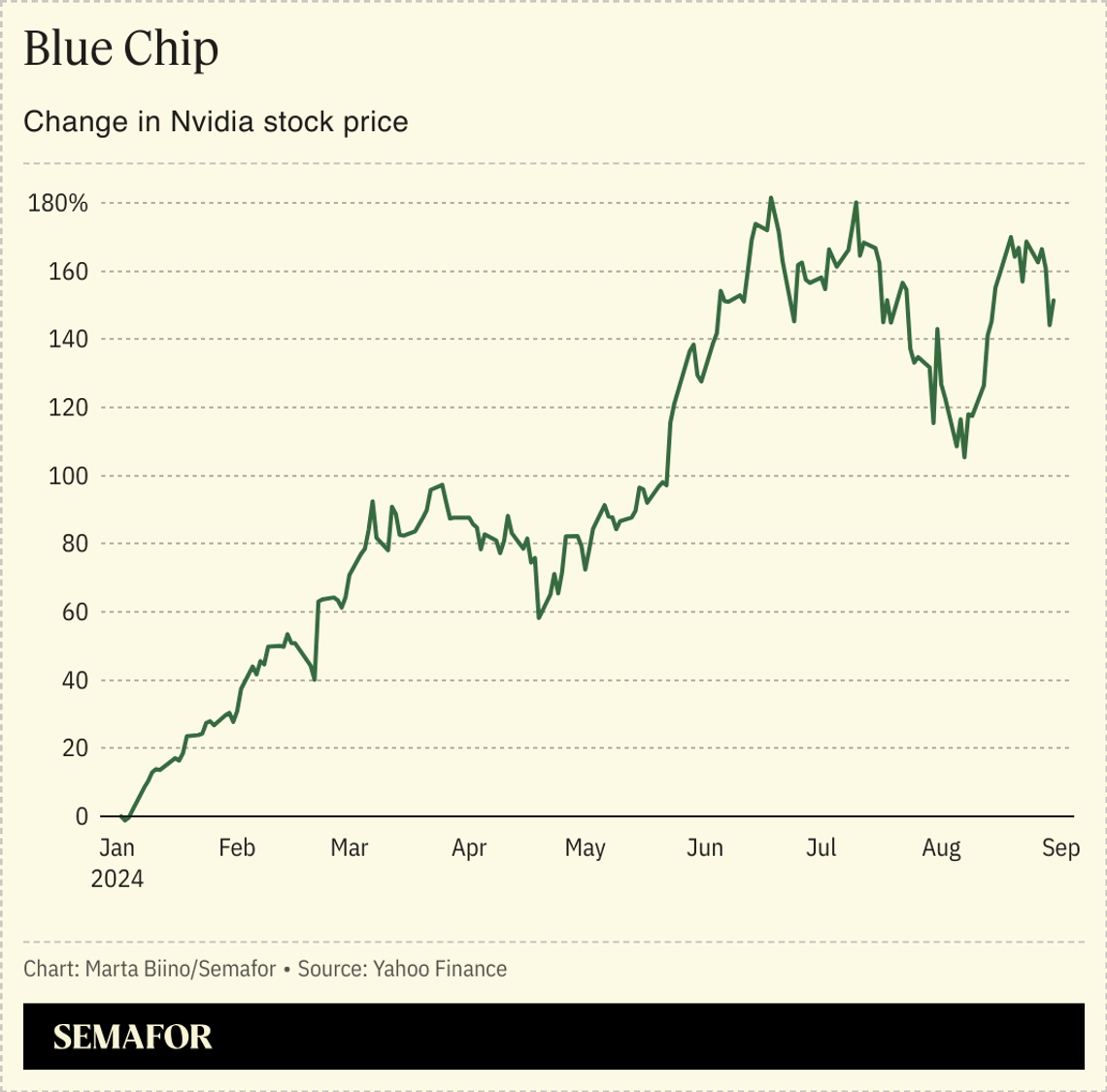| In today’s edition, we look at the stakes for California Gov. Gavin Newsom as he weighs whether to v͏ ͏ ͏ ͏ ͏ ͏ |
 | Reed Albergotti |
|
Hi, and welcome back to Semafor Tech.
California’s tech industry is on pins and needles to see whether Gov. Gavin Newsom will veto the newly passed AI bill, which would hold developers legally liable when their software might be misused.
We’ve been covering this since February, when we interviewed the bill’s main sponsor, California state Sen. Scott Wiener. Here’s a story on the latest from The Verge.
The bill, known as SB1047, has been amended in an attempt to make it more palatable to the industry. One of the big changes was removing possible criminal penalties for software developers. Another was nixing a new government agency with power to enforce the law’s provisions.
But these revisions haven’t done much to quell what has become an increasingly emotional opposition to the bill.
This is a particularly sensitive time for California’s tech players. There’s a growing feeling that lawmakers, particularly Democrats, have turned against the industry. That sentiment had begun to push some former party voters into the arms of Donald Trump, as we reported in July.
Joe Biden’s decision to withdraw from the race opened up an opportunity for a kind of reset. That puts Newsom, who has always been close to the state’s high tech industry, in a difficult position.
Newsom is a national political figure and if he decides to approve the bill, anger over it could drive a fresh wedge between some corners of the tech industry and the Democratic party. That may undo some of the bridge building Kamala Harris has been doing in California.
It could be one reason Democratic congressional lawmakers like Nancy Pelosi, Zoe Lofgren, and Ro Khanna, along with San Francisco Mayor London Breed, have all come out against the bill.
So the significance of SB1047 may be less about the bill itself. (After all, who can really predict its impact on technology that hasn’t even been invented yet). Rather, it may be more about the message it sends to an industry that believes it’s being preemptively punished for trying to build transformative technology that could cure diseases and fight climate change.
➚ MOVE FAST: In the club. Who isn’t a part of OpenAI’s latest fundraising round? Apple, Nvidia, and current investor Microsoft are among the firms that are looking to participate as the AI darling aims to raise several billion dollars to fuel its ambitions. Like its Big Tech rivals, OpenAI is burning cash to build more powerful and bigger AI models. ➘ BREAK THINGS: On the outs. Nvidia’s stellar second-quarter results couldn’t please demanding investors. Its shares dropped more than 6% on Thursday after its sales forecast fell short of high expectations. Its next-generation chips have also hit production snags, but the company said manufacturing would ramp up in the fourth quarter.  |
|
 Wikimedia Commons Wikimedia CommonsCough sounds are helping AI detect tuberculosis cases in India, where the disease affects about 250,000 people a year. A Google AI model was trained on 300 million snippets of audio from all over the world, including sniffles, sneezes, breathing and coughs. The company has teamed up with Indian startup Salcit Technologies, which is using Google’s model to better diagnose TB. Healthcare providers in the world’s most populous country are using Salcit’s technology in remote areas that have limited access to care, Bloomberg reported. People can upload the sound of their coughing to Salcit’s mobile app, which can test for diseases like TB with 94% accuracy. Google’s model is dubbed Health Acoustic Representations or HeAR, and is based on bioacoustics, which combines biology and sounds. The company hopes the technology can be used to better diagnose and monitor diseases that affect the chest and lungs. |
|
 Inside the biggest stories transforming the Arabian Peninsula and the world. Introducing Semafor Gulf — your go-to source for understanding the rising influence of Saudi Arabia, the UAE, and Qatar. Three times a week, the Semafor Gulf newsroom will bring you original reporting that examines how the region’s financial, business, and geopolitical decisions shape the world — from culture and investment to infrastructure, climate, and technology. Navigate the region’s capital, influence, and power with Semafor Gulf — subscribe for free here. |
|
 The rise in Huawei’s net profit for the first half of 2024, the company reported Thursday. With strong smartphone sales, the Chinese telecom company showed it has bounced back from US export controls on advanced chips and other products that had hurt sales. Huawei’s gains in China are Apple’s loss. Tim Cook’s company no longer ranks in the top five mobile phone makers there. |
|
While tech industry heavyweights are jumping on the OpenAI bandwagon, rival Anthropic is strengthening ties with Amazon. Reuters reports that the e-commerce giant is turning to Anthropic’s Claude model for a souped up version of Alexa set to be released in October. Amazon looked to the startup, in which it invested $4 billion, after its inhouse AI software took up to seven seconds to answer complex queries through Alexa. Making Alexa more versatile and useful, especially when it comes to getting customers to use it for shopping, is critical to proving the product’s worth to Amazon, according to Reuters. The company will charge $5 to $10 a month for a generative AI-powered version of it. The closer commercial ties with Anthropic mimic Microsoft’s partnership with OpenAI, which has drawn greater antitrust scrutiny in the US, UK, and Europe. While using Claude may help Amazon sell more products, it could also attract a brighter regulatory spotlight. |
|
 Lisi Niesner/Reuters Lisi Niesner/ReutersDRESDEN — The rise of populist candidates in Germany is spurring the country’s tech scene into the political fray. Once hesitant to openly advocate for or against a specific political party, German players ranging from tech giants to industry groups to startups have in recent months made their opposition to the far right known on social media, in interviews, and through press releases. Their activity has escalated ahead of elections in two German states this Sunday, where the eurosceptic Alternative für Deutschland party could finish in first place, polls show. Though the AfD likely won’t win enough seats in any state parliament to form a government, the German tech sector is anxious that the party’s anti-immigration stance could hurt the country’s appeal for skilled, foreign workers, who are a critical part of Europe’s effort to catch up in the high-tech space. “A lot of people here in the company are worried about the far right,” Michael Woittennek, the CEO of chipmaker X-Fab’s Dresden site, told Semafor. He said he’s told employees that “we don’t need the far right or the radicals, that we have to vote for democratic parties, and should consider that this is important for the economic situation in the future.” — J.D. Capelouto |
|






